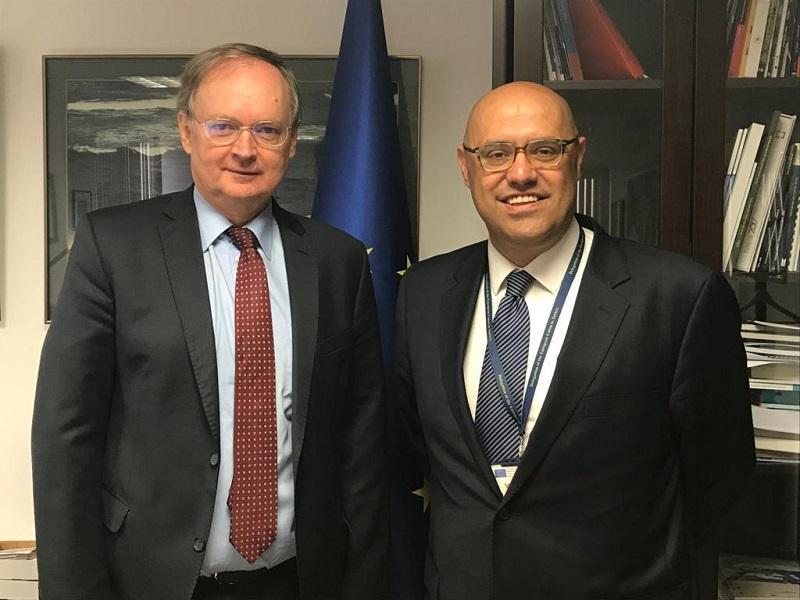
Christian Berger, EU’s Ambassador to Ankara (L), speaks to Serkan Demirtaş, the HDN's Ankara Bureau Chief.
It is clear that only together can Turkey and the European Union face very difficult crisis situations stemming from Syria, a senior European diplomat has said, announcing Brussels’ readiness to provide additional financial assistance to Turkey in the case of a massive refugee influx from the Idlib province of the war-torn country.
“I think, among things also clear is that only together we can face some of these very difficult crisis situations in the southeastern border, in Syria and over the potential spillover of the refugee influx. All these important risks and challenges, we, both the EU and Turkey, face,” Christian Berger, EU’s Ambassador to Ankara, told Hürriyet Daily News in an interview on Sept. 13.
Turkey and the EU have many common points in regard to the ongoing problem in Idlib and in Syria in general and both assess that a potential offensive into the province would lead to a massive humanitarian crisis, the ambassador said. He expressed Brussels’ appreciations over Turkey’s diplomatic efforts for avoiding a disaster on the other side of the Syrian border.
“There is a room for a lot of coordination [between Turkey and the EU] and you may know that in the coming days there will be EU member states meeting with Turkey and Russia to discuss the situation. And this will be another opportunity to send a very strong message about the situation. We will have, in the margins of the United Nations General Assembly, a meeting with the EU foreign ministers on Syria and I am sure Idlib will be at the top of the agenda. Foreign Minister Mevlüt Çavuşoğlu will also be there, so Turkey will have a very strong voice there,” he said.
EU ready for additional assistance
One important aspect of the potential Idlib operation is that it could trigger a massive refugee influx to Turkey and Europe. The ambassador explained the EU has a clear understanding on Turkey’s situation in regards to a new influx, making it clear that the EU is also prepared against a human catastrophe.
“We, of course, must be prepared for that. We already provide assistance and I am sure the EU Commission will be ready to provide additional assistance. Our colleagues from the Brussels’ humanitarian department are already in touch with our partners on the ground and we are monitoring the situation very carefully. So, if there will be a need for assistance, I am sure it will be mobilized” he said.
The EU has recently approved the release of the second installment of three billion euros in refugee assistance to Turkey. Depending on the situation, Brussels will be able to shift funds and use the money in a very flexible way, Berger said.
Turkish economy resilient in long run
On the ongoing economic turbulence Turkey has been undergoing, Berger recalled President of the EU Commission Jean-Claude Juncker’s statement that the “EU has a very strong interest in seeing a democratic, stable and prosperous Turkey.”
“I think this is very clear. You are our neighbor, a very big country on the southeast flank of the EU. So, if Turkey is stable and prosperous this has a very strong effect on the EU. Then obviously when we look at trade figures, Europe is the biggest trade partner for Turkey … There are massive trade exchanges between Turkey and the EU, so we need to protect it and keep it going,” he said.
Sectors like the automotive, banking, food and services of Europe want to see a strong economy in Turkey, Berger stressed, citing a young and well-trained labor force as well as extremely good entrepreneurs as the main aspects that make the Turkish economy resilient in the long run.
“So, I think if Turkey can fall back on these resources once it has addressed its macroeconomic imbalances, of course, the situation will improve again. And it will reinstall some confidence in the investors,” he said. The ambassador also stressed the need of strengthening the rule of law for the betterment of the economic environment for investors.
Return to reform process is positive
The EU envoy also commented on a recent meeting of the Reform Action Group after a three-year break. Recalling again Juncker’s words that the EU “wants Turkey to come back to the European path,” Berger said the meeting of four key ministers and statements for future reforms were regarded as a positive move.
“I think the message of this scene was welcomed and we have to now see how all the measures that have been announced on that paper will be worked upon: The judiciary reform, issues on the human rights action plan and many other things on that reform paper,” he said.
Talks over visa liberalization are ongoing although the EU Council has decided not to work on the Customs Union and accession talks, Berger informed.
“There was a decision taken by member states not to work on it [the Customs Union]. But this was a few months ago and we have to see how it will be developed in the light of political development and reform efforts,” he said.
Mogherini to come to Turkey
With efforts from both sides to improve ties, the dialogue has been revived between Ankara and Brussels in recent months. Berger announced that the high-level political dialogue between Turkey and the EU is in the pipeline and EU High Representative Federica Mogherini and EU Enlargement Comissioner Johannes Hahn planned to pay a visit to Turkey. EU’s Transportation Commissioner Violeta Bulc will attend the inauguration of Turkey’s new airport in Istanbul as well.
“I think it’s good because dialogue will help to address challenges and risks we are both facing and that also helps us to agree on what we can do together to move this relationship forward,” he added.